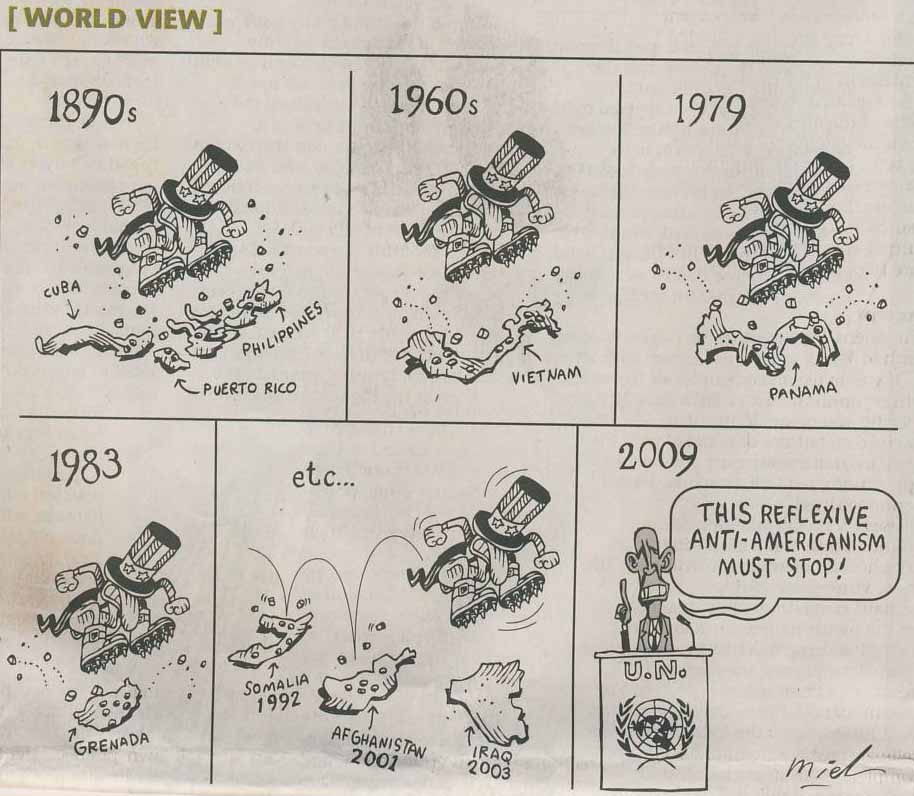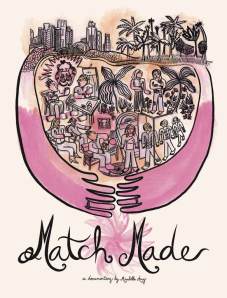Right where I want it! Here I am doing my End-zone Dance.
To put that on record, the phrase “performing your own End-zone dance” means once you have a touch-down, you run to the border(s) of the field to celebrate. Be as exaggerated as you can be because people will remember you for that. Once people remember that standard end-zone dance of yours and you are readily associated with it, your value would have increased because you have now sort of become an icon, your action to be copied by adults and children alike around the world. That’s if you are a famous American footballer.
Applying this to a more familiar context, soccer, the idea isn’t that different, actually. You score a goal and you celebrate. Millions around the world can see you, copy you, adore you now more than every before. Your move becomes a trademark.
Let’s not forget Usain Bolt and his pose. And his Puma shoes.
And my Puma shoes:


Art Above All

(Straits Times, Sep 27, 2009)
While we are frequently reminded to move on, some other country takes history very seriously.
Hail!
 German artist Ottmar Hörl’s controversial Nazi-mocking gnomes
German artist Ottmar Hörl’s controversial Nazi-mocking gnomes
(Werner Scheuermann)
Like the Germans, the Americans generally feel that the fate of the country, be it self-description or self-preservation, lies not just in the hands of the government but also the palms of residents.
TIME Poll (Sep 21, 2009):
68% of Americans think most Americans do not live up to their responsibilities as citizens
42% says businesses can’t be trusted to make socially responsible decisions–it’s up to the government to make sure they do
49% of Americans will make socially responsible decisions without the government telling them what to do
50% of Americans are willing to pay more in federal taxes to provide universal health-care coverage for all Americans
And this reminds me of a Greenday song…
Wordz
I think my lecture yesterday was “boomz”. Oh well. I’m craving for “junk food”. “Drumlet” sounds delicious. All seems well, according to TIME, for Coke’s recession “boomlet”.
“Boomz” I say.
I think “boomz” is going to be a beautiful word, not because it was used by a Miss Singapore/Convict.
“Boomz” can be positive or negative, depending on the context. Sounds like a zwitterion.
I believe no one here knows it better. My arsenal of dictionaries have defended so many hatchlings over the years that I feel like Mother Che Goosevara.
“Boomz” has the potential of becoming a very powerful word, like the humble “lah” or the vulgar F-word.
F-1 saw the Crashgate cheats punished, and I wonder how Ms SgCon won the competition. Boomzgate?
Nixon would be proud of these similar developments around the world since Watergate in the 70’s.
I could feel enraged with the fact that she lacks the grey matters, and the character. But I think it is not a crime to be weak in the language when your “predisposition” (to borrow from Bourdieu) did not allow for it. Unfotunately, it has always been a crime in society.
I would like to believe that it is more dangerous to be pretentious in language. The times are achanging, and there’s usually no need to use fanciful terms when simpler synonyms exist, especially when you do not know the words well enough. “Whilst”, whilst it sounds posh and can be delightfully used if you have also been faithful to formal British English, will kill you for the Zee in some words. Recognize!
I’m not sure if anyone is hoping that “boomz” be seen as a Uniquely Singapore word.
But trust me on the impact of boomz. Boomz!
I’m gonna get, gonna get get the Black Eyed Peas down for a Boomz Boomz Pow featuring Will Smith who will Boomz Shake the Room for a Post F-1 Boomz Concert this weekend.
Boonz, signing off.
Dignity in the Coiffure
This happened way before 2009 so I thought everyone would know this bit of Singapore history…
This explains a lot of things… like how I am always stopped at the customs. (And also why I have such an unforgettable mugshot for my driver’s licence!)
Sep 12, 2009
Past in posters (extract)
By Deepika Shetty, Straits Times
A ‘poster boy’ for the impact the posters had on society is musician Jatt Ali, 53. The Long Hair poster with the tag line: Males With Long Hair Will Be Attended To Last, has some hair-raising memories for him.
The authorities at that time associated people with long hair with hippies and drug addicts.
Jatt tells Life!: ‘This is from the 1970s. I had long hair and each time I went to the post office, I was served last. People took these posters seriously.
‘Once I was even picked up during a police ambush in the Peninsula Plaza area and ended up missing the show I was meant to perform at. Together with 20 other long-haired boys my age, I was locked up for 12 hours. My parents made a lot of noise after that and kept asking me to cut my hair, but I never did it.’
Arts impresario Robert Liew, 60, too, recalls the poster. He says: ‘We equated long hair with individualism. The Government equated it with undesirable Western influence, primarily drug consumption.
‘There was a fair amount of consternation, but before things came to head, no pun intended, it was all over, the drug threat abated and the length of one’s hair returned to the domain of fashion.’
Sociologist Paulin Tay Straughan, 46, points out that beyond the obvious and in-your-face messages, these posters tell an important story.
‘My mother was a nurse in the Family Planning Department and I pretty much grew up with the Stop At Two message. Things were so much simpler then. The fact that we have to use fancy effects, new media and phrase our messages cleverly now shows how far we have advanced as a nation.’
She adds: ‘I know some of these posters seem like a real blast from the past and are extremely amusing. But they also show how Singaporeans did not question as much in the early days. Having survived the war, all people wanted was stability. They had full faith in their lawmakers and there was no cynicism.’
No Dignity, No Diggity
(I may be delivering the feedback lecture on the Prelim AQ using materials here, so stay tuned.)
“No diggity”, according to unreliable sources, means “no doubt”. It’s a slang and the title of a song, but this post isn’t about that.
Dignity, the sense of rights entitled to one, is sometimes the thorn in the flesh of some Singaporeans. Freedom of expression (or its limit) is one such right that can make one feel indignant about living in Singapore, although they have less to complain nowadays as it is obvious the rules are slowly being relaxed. Slowly but surely.
Of course, and ironically, the word “indignation” has also taken on a rather negative meaning in Singapore. IndigNation is a gay/lesbian-pride movement in Singapore and some of its activities have usually been barred by the authorities over the years. This community is feeling indignant about their status; to them, the rejection they face removes dignity from them. On the other hand, their existence has also been making some Singaporeans indignant. How dare they feel indignant over our indignation!
Singapore isn’t such a boring place after all.
Besides, we have exciting shows on TV or in cinema (be it indie documentaries or mainstream fare).

Aug 29, 2009
Bride-hunt in Vietnam
A documentary shines the spotlight on Singapore men who go to Vietnam in search of wives
By John Lui (Straits Times)
Five years ago, Singaporean furniture salesman Ricky Yeow, then 38, went to Ho Chi Minh City in search of a wife.
He was one of thousands who go to Vietnam every year from Singapore, Taiwan, South Korea and the West for this purpose.
But in his case, Singaporean documentary-maker Mirabelle Ang, 32, went along to capture the events. In five days, he had chosen and married 19-year-old Nguyen Thi Nhanh from the village of Dong Thap, four hours west of Ho Chi Minh.
A 48-minute account of that venture, Match Made, will screen at independent cinema Sinema Old School at Mount Sophia from next month.
Ang’s documentary was screened at the Singapore International Film Festival in 2007 and at festivals in Vienna, San Francisco, Budapest and Vietnam.
Sinema Old School programming manager Inez Maria says the theme of matchmaking was selected for next month’s screenings because with increased globalisation, there is a need to ‘understand what makes First World citizens seek soulmates in Third World countries’.
Sinema came into existence in late 2007 and missed the chance to screen the film earlier, she adds.
‘Even though we are a platform to screen local independent films, we do need time to research quality films and it took us a while to find a film as good as this,’ she says.
Ang, a Ngee Ann Polytechnic graduate, says she first got the idea to film the bride-hunt after reading in The Straits Times in 2002 about a matchmaking agency run by businessman Mark Lin.
She spoke to Life! by e-mail and telephone from Los Angeles, where she is now working as a documentary editor.
She says: ‘The article had a photo of a Chinese man with his docile wife, standing in the background in her pyjamas, smiling. I saw a larger issue behind the story and knew that I had to make a documentary about it.’
The then graduate student of the California Institute for the Arts (CalArts) approached Mr Lin, who asked one of his clients, Mr Yeow, if he would take part.
Ang says: ‘Ricky was very kind to agree to participate in the film. �I told him I was a graduate student and that I was interested in learning about the matchmaking process and would like to follow him while he was in Vietnam. He agreed.’
People who saw the film when it screened in Singapore two years ago said the rapid and business-like bride interviewing process was an eye-opener.
Says Ang: ‘After we arrived, we were driven to our hotel and told to meet in 20 minutes at the lobby to drive to another location where Ricky would meet the girls.
‘Two hours later, we were crammed into a dingy hotel room and everything unfolded before us. It all happened very quickly.’
To make the film, her first feature documentary, Ang travelled to Vietnam with Ms Susan Kim, who was a fellow graduate student at the film/video programme at CalArts. Another CalArts graduate, Mr Tuan Nguyen, a Vietnamese-American, helped with translation.
The self-funded project cost about $10,000 to make.
Ang, who graduated from CalArts with a master’s in film and video in 2006, says one of the hardest parts of the job was the language barrier.
‘I wanted to speak to the Vietnamese girls, who were mostly, if not all, younger than me. I wanted to hear their story, away from the watchful eyes of the men and women ‘taking care’ of them while they were in Ho Chi Minh waiting to be matched with potential grooms.’
The documentary includes an interview with Ms Nguyen in her home village and one with Mr Yeow in his four-room HDB flat in Singapore, where he is the oldest son living with ageing parents.
Ang hopes the film will ‘provoke questions’ from the audience about what people will do to obtain a better life and how economic imbalances between countries affect lives.
In such arrangements, the Singapore matchmaking agency is usually paid $8,000 or more, while the bride’s family receives a token amount. The bride hopes to get a husband who will provide her with a better life than the one she would get in her home country.
Ang says Mr Yeow has since refused to speak to her, for reasons which can be gleaned from watching the film, she says.
‘There’s a very delicate line between being a documentary film-maker, and being human and a witness to events. As documentary film-makers, we are constantly negotiating between that fine line,’ she says.
Do documentaries and similar expose risk the dignity of individuals especially in the context of a conservative society? It isn’t so much about the dignity of the objects that is lost but the dignity of the subject: the film(maker). That is the “very delicate line”. Is art supposed to mirror life without giving a definitive face to the image? Can art do that?
If art poses such uncertain terms in life, what about trashy shows that are mindless naturalism? I’m sure everyone has encountered the term “reality TV” many times before. The Truman Show should ring a bell too. (And of course, there is Banksy.)
Sep 5, 2009
Face it, the world is watching you
By Jonathan Holburt (ST)
The future just isn’t what it used to be. In George Orwell’s novel 1984, we thought we saw an accurate depiction: An omniscient dictator whose eyes were on everyone. At a time of Hitler, Stalin, Mussolini and Franco, it resonated. But now, instead of “Big Brother”, we have lots of little brothers and sisters, mums and dads — in fact, everyone — looking at all of us all the time.
Take Jade Goody. The British TV star of reality show Big Brother died of cervical cancer earlier this year. She broadcast her dying days for everyone to see, making that most private and tragic of acts a public spectacle. “I’ve lived my whole life in front of the cameras,” she said. “And maybe I’ll die in front of them.”
But this new transparent world isn’t just for prurient types. China, for example, realises you can no longer control information by just controlling the press. The press, nowadays, is the people. Anyone with a camera phone is a journalist.
Protesters at riots in Shishou city in Hubei province took videos on their camera phones and put them online. Dr Yu Jianrong from the Chinese Academy of Social Science said of the June event that “it was like a live telecast”. This fact is not lost on media outlets like CNN, which often solicit images from people on the spot.
The case of Neda Agha Soltan, the Iranian student whose death was captured on camera phone, gave the Iranian election protesters a martyr to rally around.
The Chinese government’s response to all this has been multifaceted : a failed attempt to put web-filtering “Green Dam” software on all PCs, jamming mobile phone signals during moments of unrest and, on occasion, even disrupting the Internet.
But with some 750 million mobile phone users and now 322 million online users, it won’t work. In the never-ending battle between the sword and the shield — the sword being information, the shield being control of it — the sword always wins.The cheapest mobile prepaid is giving away free minutes.
The future wasn’t always supposed to be this way. For example, in the science fiction film series The Matrix, what humans perceive as reality was actually a simulated world, created by machines to pacify and suppress human beings. It was an opaque universe where nothing was as it appeared to be. And based on what is happening today, that really was fiction.
Because now, more than ever, everything is visible to everyone. From Bloomberg to Twitter, Facebook, Linkedin and other social networking sites that tell you more about a person than you care to know, to Google Maps and geo-location devices that can pinpoint where you are at any time, you can’t escape being visible to all — at all times. What’s driving this change? Technology, plus politics, plus the universal desire of human beings to know more about more things.
When Jemaah Islamiah terrorist Mas Selamat Kastari escaped from custody in Singapore, his face was sent to 5.5 million cellphones as part of the manhunt to find him. The most wanted poster is now no longer stapled to a wall — it’s in your pocket.
New companies such as ReputationHAWK and ReputationDefender will help protect or blunt Internet attacks against ordinary people, especially as everyone who looks for a job nowadays is the subject of a Google search. Apparently, these companies do it by creating positive data about you, which crowd out the negative.
In his 1969 book, The Human Zoo, zoologist Desmond Morris articulated a vision of humanity suffering from unnatural relationships in civilised environments. What would he have written about the world today? Are we really in a new age of totalitarianism — let’s call it multitarianism — with 1984’s Big Brother morphing virus-like into curious stares from everyone?
There’s a saying, “people who live in glass houses shouldn’t throw stones”. In this transparent age, the entire world is a glass house. And certainly that moderates behaviour — from countries to companies. Pariah-hood is more easily achieved today.
In 1928, public relations guru Edward Bernays, wrote: “The conscious and intelligent manipulation of the organised habits and opinions of the masses is an important element in democratic society.” In the near past, countries and companies controlled how their reputations and brands were received and perceived through carefully crafted communication. It was one-way communication: Companies spoke; consumers listened. Countries spoke; citizens obeyed.
Now, it’s two-way communication, even a dialogue, with people responding via the town halls and public squares of today: social networking and blog sites.
Which comes back to the way to thrive in this new world. Since it really is the age of transparency, everyone, including officials and managers, will have to truly understand the new rules: Whatever you do will potentially be watched and analysed by everyone.
The big world has become a small village again, where we are all watching our neighbours. As Allen Funk said on his long-running show: “Smile, you’re on Candid Camera.”
Now we all are. Literally, all of us.
Dignity is also lost, some argue, with media piracy. You lose the sense of self-worth as it is expeected of you to respect the works of others.
Aug 29, 2009
Law to block Net pirates unlikely
By Andy Ho (ST)
SINGAPOREANS make 350,000 illegal movie downloads a month. On a per capita basis, we notch up some of the largest numbers of infringements in the region.
Thus, content owners are hoping for a new law to get Internet service providers (ISPs) to deny habitual infringers Web access. But Parliament is unlikely to pass such a law.
If the United States Congress passed such a law, Singapore would be obliged by its free trade agreement (FTA) to put in place reciprocal legal arrangements to protect US creations. (Some 80 per cent of our Internet traffic access US websites.)
However, the US is not likely to do so. Congress has, indeed, extended the term of copyright protection twice. In 1976, it was raised from a total of 56 years under an old law to the life of the author plus 50 years. Then, in 1998, it was increased to life plus 70 years. If an author lives for 50 years after he creates a work, he would have 120 years of copyright. (An inventor’s patent rights last for only 20 years.)
Thus, Congress has been increasingly protective of copyrights. Still, it is unlikely to pass a law to compel ISPs to deny habitual pirates access to the Internet.
Here’s why.
In the US, anyone may lobby Congress to pass legislation that serves his interests. But it is interest groups with the most resources that tend to have success. Hence, a firm like Disney would lobby hard for, say, an extension of copyright protection. Indeed, Disney actively lobbied for the 1998 extension and got it.
In that case, it was the classic situation that experts describe as ‘concentrated benefits, diffuse costs’. That is, small groups which have not simply the incentive but also the wherewithal to organise and lobby US lawmakers to pass legislation that benefits them will do so.
They tend to succeed where the costs which such a law imposes on others are borne by the public at large. This is because each individual will bear only a small part of the costs, so no one has the incentive to organise to fight the lobbying efforts of such corporations.
The 1998 extension would benefit a few large corporations – content owners like Disney – but the costs would fall on all consumers worldwide. In 1998, content holders got what they wanted with little ado because the congressmen arrayed on their side were fortuitously able to cast the proposed extension as harmonisation with European Union (EU) law.
Under EU law, which then offered longer copyright protection of life plus 70 years to European creations, foreign (read: US) works which had lost copyright protection under their own (read: US) laws – even if they were under life plus 70 – would not be protected in Europe.
A US film-maker stood to gain an extra 20 years of copyright protection if it used, say, a British director or a German composer. Given this, US jobs would go to Europeans. To prevent such job losses, it was argued, the extension was needed. Because the costs of the extension to individual consumers – in the US and the rest of the world – would be small, there was little organised opposition to it.
Notice, however, the law was passed before the Internet really took off. At the time, there was not really widespread distribution of copyrighted content by anonymous Internet users yet. Now there is.
To fight this piracy, content owners have tried consumer education. They have also hauled some infringers to court to make examples of them. Then they have tried to convince users that the genuine product (which comes with electronic locks) is of higher quality. However, users seem quite contented with the quality of music and movies they can illegally get for free on the Internet.
Because all these strategies have failed, content owners would like legislation to require electronic equipment makers to incorporate technology that identifies and tracks users. But hardware makers oppose this as it would increase their production costs, which cannot be passed on to consumers. People would not pay higher prices for a technology they do not like.
The problem here is that there are concentrated benefits to content owners but also concentrated costs to equipment makers. This scenario has interest groups with huge resources but opposing interests pitched against one another. In such cases, Congress is not likely to act.
In fact, a law proposed in 2002 (called Consumer Broadband and Digital Television Promotion Act) was precisely this sort of legislation which failed to pass in Congress. The movie studios and music labels wanted equipment makers to build into their widgets copy-protection and user-tracking technologies. The manufacturers opposed the Bill, which just died.
Now content owners are considering another approach, the one being bandied around in Singapore. This is to get ISPs to police copyright infringement. Currently, under both US and Singapore law, ISPs do not bear any liability for any copyright infringements by their subscribers.
To track file sharing by their subscribers, ISPs would have to use a technology that places a unique tag on every file every time it gets transferred. Here again there are concentrated benefits to content owners but concentrated costs to ISPs. Given privacy concerns, this would enrage their subscribers as well.
In this instance, the lobbying power of the content owners is matched by that of the ISPs and also equipment makers. Hence, Congress is very unlikely to pass any Bill that puts the onus on one side to benefit the other. This being so, Singapore is unlikely to pass an analogous law under its FTA obligations any time soon. Indeed, the authorities here say now that no such law is being actively considered.
Seems like consumerism and capitalism have created problems: while consumerism affects the dignity of oneself–how low can you stoop?–capitalism ensures companies remain profit-driven at the expense of the dignity of individuals (illegal downloaders and even loyal customers). Here we see how piracy cuts both ways, dignity diced.
Lot 99 on 999

This is no gimmick, but it happened as chance would have it. I’ve got lot #99 on the 9th of Sep 2009!
GP is not about U!

I think this would make a good cover for next year’s GP Times!
After a while of marking, we all need some crazy banal moments. But seriously, the progress is so-far-so-good–even after mindless hours of defending students’ answers. I feel like a lawyer. Maybe that will give me the licence to whine, wine and dine.
It wasn’t a good idea at all to mark with the rest of the crazy folks in public (KFC, to be precise; the one near KBox). Besides the occasional familiar grey clouds whisking past, our thunderous roars of laughter and derision about anything can sometimes be a bane to the uninitiated. We could be STOMPed.
Naturalism, ladies and gentlemen, right here, now, brought to you by the marvel of 21st C.
I love Prelim passages: they are always so meaningful.
This new word is totally, like, y’know, way too beyond me, dig it:

More last words on 02092009
Q&A for LT3 Lecture on 27 Aug 2009
1) Why can we use almost the whole of passage B paragraph 8 as text reference? How does this link to common man’s reduced access to, and hence control of, real information?
Those lines I highlighted are potential line references and they don’t mean you have to use them all. It all depends on what the point you are using and talking about. Some good ones may not even be relevant. For Passage B, I am looking particularly at the point that talks about how media channels rely on advertisements and other corporate tie-ups and the information they present to viewers are sometimes not objective. My specific example is on Channel Newsasia, who don’t have access to Barclays Premier League and the information they presented may not be as “real” as it should be (“real information” in the form of raw footage vis-s-vis spoken or written information which have, on some occasions, led to mispronunciation or wrong information). The whole idea is on consumerism: you pay what you get. CNA is a free-to-air channel, unlike Football Channel, and the tie-ups with corporations lead to one main issue. Common man’s access to real information is restricted if he does not have the money to afford it. You can also talk about how advertorials on lifestyle shows affect real information, and you don’t have control of it because it is all presented to you. You can’t choose after a fair comparison with the rest of similar products and services. (I think I have a post on my blog about a speaker who used the analogy of “buffet” vs “set-meal” when describing the situation.)
Is the text reference used from passage B, l46-49?
I used just the reference “code for giving the public no choice” (B l.49). You can use B l.46-9 to answer R2, but I used the l.49 phrase to answer R1.
2) From the sample paragraph which address R2:
– Although shows catering to “prurient interests” are still rare due to societal values and the closest you can get is S-factor.
– Which shows that people has the control (otherwise profit-driven companies will many of such shows since sex sells)
– Which is somewhat unlike what is described: “poverty of the majority of humanity” (B, l27)
I don’t understand how does these answer R2.
R2 is about media objectivity in Singapore. I am using Passage B against itself. My stand is that the local media authority has done well so far in balancing the interest of corporations and viewers and the country, and they should continue to do so. The media here is still rather objective, considering this need for balance. We don’t have channels like the Naked News, which are present in Europe and even Korea. This is because besides the government, people in society are also against such prurient materials. (I’ve also cited the local authority’s stand on my blog a few weeks ago and from his presentation, we are assured that the MDA takes feedback from the public very seriously.) Thus “poverty of the majority of humanity” doesn’t apply to the Singapore context. We are not morally poor, and the authority has done well to listen to the public’s voice and they must continue to do so while balancing the requirements of the three stakeholders.
Is morally poor referring to us having a choice of what to watch?
Being morally poor means to choose to watch programmes that are amoral or programmes that are full of half truths or lies. Remember that the phrase in B l.27 also refers to the literal meaning of “poor”: no money, no power.
***
Do note that the topic sentence of the passage paragraph may not be the topic sentence of your AQ response paragraph, like the case in (2). That only means your own topic sentence must be clear to the readers.
Some last words on the first day of September
Finally had a good long sleep. Still surprised I managed to pull through Monday with just 1.5hours of sleep. Haven’t done that since Chinese New Year years ago.
I am still browsing through all the goodies I got from students, friends and colleagues. Here’s a special mention to the cupcake from Ms Joy Tan:

I ate it straight after snapping it. It was really very sweet. It looked so…unreal!
The 2208 Report Card looks daunting (I have not yet done my Work Record that was due last Friday!) while the 1508 Journal is a good source of quotable quotes just in case I run out of them, and the 0408 Card reminded me again of my belt. There were a few more little gifts that look too nice to open. But a surprise was greetings from Catherine and Joanne, and Joji.
And on Saturday I finally used the pink Gatsby Rubber mud from 1508 last year. Maybe I applied too much of it. It is really sticky. It is certainly waterproof. It certainly gave my hair a lift.
With regard to lifting, in case some are still not sure, here’s just one reminder (the other tricks I have said them all before many times, if you are still panicky, leave me a Comment here):
(Yes. This is the moment that most of you who are still browsing this blog are waiting for…)
Synonyms used in other parts of the passage that are not directly relevant to the question or paragraph can be used, but as far as possible, use your own words. Note that this DOES NOT apply to Summary, which requires paraphrasing to be done all the time as far as possible.
Here are some more comments on T3P2A2 (lifting wasn’t closely watched, by the way):
For Q2, “seemingly endless catalogue” is accepted along with “seemingly endless”. Both are phrases. The former is a full noun phrase while the latter is an adjectival phrase, technically speaking.
For Q7, if only “aggression” or “violence” is mentioned, it is fine for this because the focus of the passage is on the exact same topic, plus the contextual clues given (eg: “grunts”). Of course a complete answer will encompass unity and aggression.
For Q6, your answer must encompass both the work domain and the home domain.
If you see the comment “good/very good” for a question, it means few people have answered that question correctly but you.
That’s all I have tonight!
PS: You should have also received a model AQ response to the CAM2007 paper (I gave one to each class). Keep it well.
-
Archives
- January 2011 (2)
- November 2010 (6)
- October 2010 (4)
- September 2010 (6)
- August 2010 (5)
- July 2010 (13)
- June 2010 (9)
- May 2010 (3)
- April 2010 (4)
- March 2010 (6)
- February 2010 (1)
- January 2010 (4)
-
Categories
-
RSS
Entries RSS
Comments RSS